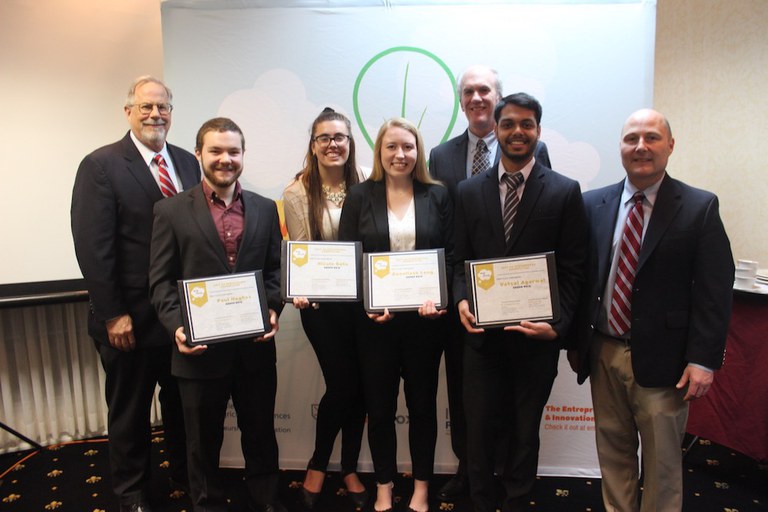Posted: April 8, 2019
GreenBriq is turning invasive plants into sustainable fuel for Kenyan households. Inakua, the second-place winner of $2,500, plans to rent water-efficient hydroponic growing towers to Kenyan families to reliably grow their own vegetables.

Dr. Gary Thompson, left, Associate Dean of Research, GreenBriq students Paul Hughes, Nicole Dato, Annaliese Long and Vatsal Agarwal, with E&I Director Drs. Dan Azzara, rear, and Mark Gagnon, Harbaugh Entrepreneurship Scholar, right. (Cameron Callanan)
GreenBriq, a venture to turn the biomass of invasive water hyacinth plants into affordable fuel briquettes for Kenyan families, won the $7,500, first-place prize April 3 in the Ag Springboard student business pitch contest.
The second-place winner of $2,500 is Inakua, a venture to rent water-efficient hydroponic growing towers to Kenyan families to reliably grow their own vegetables.
"We're going to get it done and try to help as many people as possible while building a company," said Inakua team member Jessica Novis (an industrial engineering major). They'll keep working, said Inakua teammate Zaid Hmoud, (an electrical engineering major), and use the prize money to test Inakua's customer service model. Perry Lehrhoff, an agribusiness major, is also part of the Inakua team.
Greenbriq team members reacted to the announcement at the Ag Springboard evening awards banquet with smiles, excitement and disbelief. Some said it was "surreal" to hear the team name called.
Ag Springboard provides students with real-life experience of developing a venture and learning to pitch. Four finalist teams live-pitched a panel of judges Wednesday, and winners were announced at an evening awards banquet, featuring keynote speaker Tyler Smith, who played on Penn State's "Sweet 16" men's basketball team in 2001, played pro basketball around the world for 11 years and is now an author and local entrepreneur. The banquet was held at the Atherton Hotel.
The competition, the eighth held since 2011, is a signature event of Entrepreneurship and Innovation at the College of Agricultural Sciences -- which teaches and nurtures an entrepreneurial mindset for student success across majors and career paths.

"Ag Springboard provides students with an opportunity to develop and communicate their venture ideas," said Dr. Mark Gagnon, Harbaugh Entrepreneurship Scholar and Entrepreneurship Coordinator. "During the process students grow professionally through interaction with peers, faculty and our alumni judges. Ag Springboard provides essential experiential learning that ultimately helps our students be more prepared for career success."
The GreenBriq team: Paul Hughes (a senior mechanical engineering major), Annaliese Long (a senior biological engineering major), Nicole Dato (a senior civil engineering major), and Vatsal Agarwal (a junior material science and engineering major).
The next step, said Agarwal, is to make more charcoal briquettes and keep refining the process. The team will continue working on its product development, said Hughes, and looks to further research and development this summer to establish the venture's viability and "proof of concept." Dato and Hughes will return to Kenya this summer for further research.
The students started working on the idea about 18 months ago, when tasked with finding engineering solutions to humanitarian problems, as part of the Humanitarian Engineering & Social Entrepreneurship program at Penn State.
GreenBriq's goal is for its briquettes to solve a few problems at once. In the last few years, the price of daily charcoal for a Kenyan family rose to become 50 percent of a household's daily income -- so there is a great need for affordable, sustainable cooking fuel, the team told judges during its live-pitch Wednesday.
Also, for decades, Kenya and its neighboring countries that share the Lake Victoria basin, Uganda and Tanzania, have battled the invasive water hyacinth that is choking parts of the world's largest tropical lake.
The plant proliferates, and doubles its growth in two weeks. It is one symptom of agricultural runoff and raw sewage draining into the degraded lake. Fishermen have trouble reaching their boats among the vegetation and have seen their catches plummet. They cut the plant away with machetes.
GreenBriq's plan is to partner with fishermen to harvest the water hyacinth and use a five-step process to turn the plant growth into briquettes. Their customers would be Kenyan fuel brokers. The team's initial research indicates Kenyan brokers would welcome a reliable supply of briquettes after a period of shortages, said the team during its pitch.
End-consumers would be women and restaurants. The GreenBriq "charcoal" briquettes are compatible with existing biogas stoves found in many households, and burn at proper rates for cooking. Some fuel alternatives heat too high and fast, are difficult to control and burn traditional foods, said the team during its pitch.
Other ventures are making charcoal briquettes out of waste, but no one is doing it with water hyacinth, the team told judges.
Ag Springboard final round judge Anne Yorks, owner of Flour Box Bakery, complimented the team for a venture that aimed to solve multiple problems at once. The panel of judges included Weslie Khoo, owner of Bold Foods -- whose team Cricket Pasta won Ag Springboard in 2017 -- Bill Donley, former CEO & President of Tangent Corp. and chairman of the E&I Advisory Board, and Dr. Dan Azzara, director of E&I at the college, Alan R. Warehime Professor of Agribusiness and former senior VP, Global Research and Development for The Hershey Company.
Team Inakua tackled the problem of 18.6 million people in Kenya who do not have a stable supply of food, in part due to sporadic rain patterns. Novis and Hmoud are also participating in the Humanitarian Engineering & Social Entrepreneurship Program.
Inakua Wins 2nd Place, $2,500
They plan to rent hydroponic growing towers -- in which nutrient-rich water is pumped and trickles over the plant roots -- along with seedlings and nutrients. The setup can yield 450 pounds of vegetables for a family of five. The team's goal is to empower families to secure and grow their own food source.
Inakua's vision is to build a network of greenhouses in Kenya. Each can serve a community of 2,500 households in a 28-mile radius. The greenhouses would grow the proper seedlings and store equipment to service the towers in that community.
In time, Inakua envisions serving 3.4 million people in a way that empowers families to grow their own food and control their own food source.
The team has been working on the concept since Jan. 2018 and traveled to Kenya last summer for research. One Kenyan man who has tested the setup grew enough vegetables so that the family had an excess of crops that it could trade with neighbors for other varieties of produce -- and was no longer struggling to find and purchase enough vegetables.
Pitching at Ag Springboard -- first via video and then live to a panel of judges during Wednesday's final round -- was a wonderful experience and it was helpful to get feedback on their venture, said Novis and Hmoud.
Two other finalist teams -- Nuglys and Food Renewed -- live-pitched finalist judges.
For all Ag Springboard finalist teams and their mini pitch videos.
Social Media

Social Media


